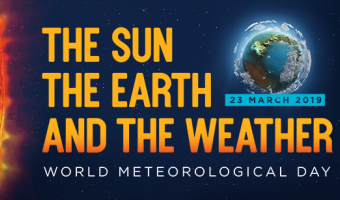Meteorology is the field of study or the science that deals with the phenomena of the atmosphere. The principles of meteorology revolve around weather forecasting and climate. World Meteorological Day commemorates the foundation of the World Meteorology Organization. This intergovernmental body got established in the year 1950. Later on, the organization became a part of the United Nations in the year 1951. WMO’s website, highlights its vision by mentioning, “By 2030, we see a world where all nations, especially the most vulnerable, are more resilient to the socioeconomic consequences of extreme weather, climate, water and other environmental events; and underpin their sustainable development through the best possible services, whether over land, at sea or in the air.”
The Theme of World Meteorological Day, 2021 Revolves Around Ocean
“The Ocean, Our Climate and Weather” is the theme of this year. It's evident from the theme that the focus is on the oceans and their contributions to our entire ecosystem. “The ocean absorbs over 90% of the excess heat trapped by greenhouse gases, thus shielding us from even greater temperature increases as a result of climate change. But this comes at a heavy price as ocean warming and changes in ocean chemistry are already disrupting marine ecosystems and people who depend on them,” highlights the press release on the website of the World Meteorological Organization.
Ocean’s Impact on Humans and Their Health
Oceans are a source of living for a large segment of society across nations. The fishing, tourism and recreation industry are to a large extent dependent on the oceans. There are many medicinal compounds and natural products that are available in these vast water bodies and so we need to value ocean’s health to keep our health intact. There have been movements conducted by dedicated organizations like the World Meteorological Organization to manage the damage that has been created by humans on the oceans by dumping huge amounts of rubbish and industrial wastes in them. It is resounding to learn that these well-meaning organizations are spreading awareness and trying to impact human life and health.
Let’s Work for and Expect a Good Future
Michael Crichton, a celebrated novelist wrote the book, "State of Fear" which spread out to 600 pages. It was the work of fiction encompassing environmental science and was based on three years of extensive research on science and environment by Crichton. Towards the end of the book is the author’s message that highlights several significant takeaways from his research. One of the pointers that he mentioned in his message is, “I suspect the people of 2100 will be much richer than we are, consume more energy, have a smaller global population, and enjoy more wilderness than we have today. I don’t think we have to worry about them.” Let’s hope that initiatives like World Meteorological Day gets successful in making such positive words come true.

 The brains of human beings are much more advanced compared to other fellow species of the earth. Hence it is we the humans who would have to regulate our behaviors in such a way that we can protect Mother Earth and the number of species spending their lives here.
The brains of human beings are much more advanced compared to other fellow species of the earth. Hence it is we the humans who would have to regulate our behaviors in such a way that we can protect Mother Earth and the number of species spending their lives here.







.jpeg)




.jpeg)






.jpeg)









.jpg)


.jpg)
